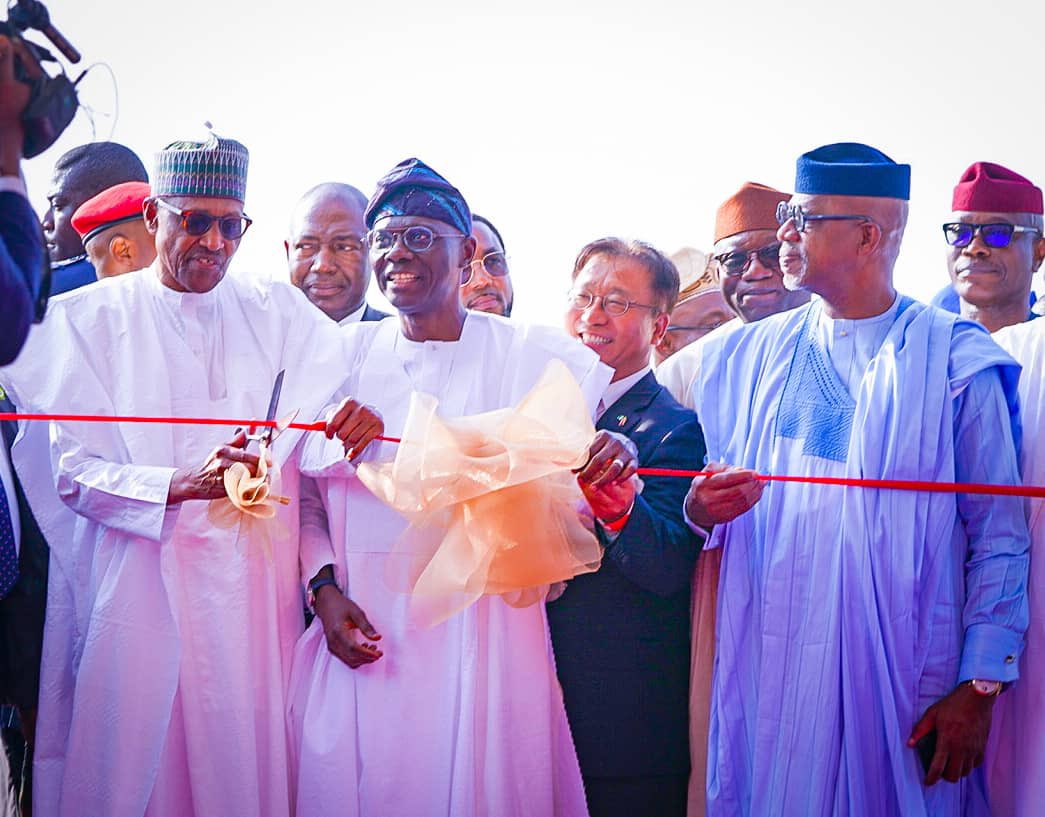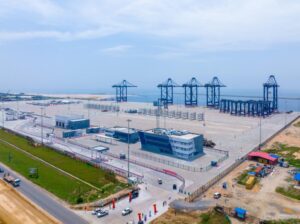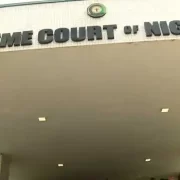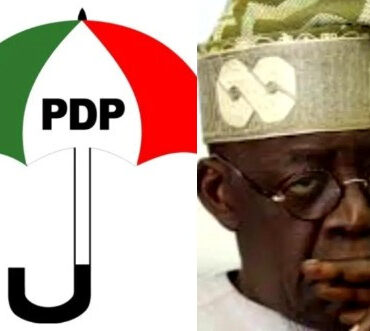President Buhari Commissions Lekki Deep Sea Port, Rice Mill

Lawyard is a legal media and services platform that provides…
President Muhammadu Buhari has officially commissioned the Lekki Deep Sea Port located in Itoke village, Ibeju-Lekki in Lagos state.
The Lekki deep seaport is one of the largest seaports in the country and one of the biggest in West Africa that would revolutionise the way goods are transported and traded in Nigeria.
The project worth over $1.5 billion is a Joint Venture between the Nigerian Government, through the Nigerian Ports Authority, the Lagos State Government, the Tolarams Group (the owner of the Lagos Free Zone), and China Harbour Engineering Company.
At the inauguration of the Lekki Deep Sea Port, the President led Governor Babajide Sanwo-Olu of Lagos State, the Minister of Transportation, Muazu Sambo, the Chinese Ambassador to Nigeria, Ciu Jianchun, top government officials and traditional rulers, to witness the overloading from the Container Ship, sailing under the flag of Malta.
Speaking at the occasion, the Lagos Governor said; ”Mr President, we are happy this is happening in your time. It all started in your time and it’s been completed in your time.
”We are excited that the size of the vessels that will berth at the port would be four times the size of vessels that currently berth at Apapa and Tin Can Island Port.
”We are excited that in your own time, something fresh has been birthed in this country and it is going to generate thousands of direct and indirect jobs.”
The Minister of Transportation noted that the inauguration of the project was made possible by the expedited manner the President handled all requests made by the Federal Ministry of Transportation concerning Lekki Deep Seaport.
”The very fact that the letter of intent between the proponents of Lekki Deep Seaport and its financial partners was signed as recently as April 2019 and by January 2023 the wide-ranging impact project is already being inaugurated, is a testament to the tenacity of purpose of the Federal Ministry of Transportation through the Nigerian Ports Authority,” he said.
He thanked the President for approving the Ministry’s extraordinary request to designate Lekki Deep Seaport as Customs Port and approved Wharf and its publication in the Federal Government Official Gazette in record time.
”With Seaports being under the exclusive legislative list, the Nigerian Ports Authority’s provision of a sinking fund for Lekki Deep Seaport Federal Government’s equity contribution gave this project the necessary statutory cover and financial guarantee in line with the law.
”Completing a project of the magnitude and impact of a deep seaport in a record time of 45 months shows the effectiveness of tenacious ministerial supervision, strict regulatory oversight and strong presidential backing,” he added.
Sambo, who described the project as one of the major legacies of the current administration, added that over 170,000 jobs would be created as operations commence.
The Chinese Ambassador to Nigeria, said the landmark gateway project jointly built by five parties from four countries is a fitting example of a good business model.
”This project is a joint venture between China, Nigeria and Singapore, and is run by a French company. The model of ‘five parties from four countries’ is a way of taking advantage of the wisdom and strength of all parties,” he said.
He pledged that China would promote this business model to pursue a Win-Win outcome, particularly for the growth, development and progress of Nigeria.
Using the analogy of three initial ‘E’ the Ambassador said the project is the Engine of the Economy, Equity of Investment and an Example of a Model Business.
On Engine of Economy, Jianchun explained that the Port is the number one deep-sea port in West Africa and one of the most modern and efficient ports in sub-Saharan Africa.
”It is estimated that the overall economic benefits will reach more than 360 billion USD, becoming a new engine of economic development that will empower the southwest region and the whole country.”
As an equity investment, the Ambassador described the port as a valuable practice for Chinese companies to move from the role of Engineering, Procurement and Construction (EPC) contractor to a strategic investor in building major infrastructure projects in Nigeria.
”The government doesn’t need to worry about the existence of guarantees or debt risks. It also shows that the investment climate in Nigeria can be trusted. We have every reason to be confident in Nigeria’s future development.”
The Managing Director, Nigeria Export Processing Zones Authority (NEPZA), Prof. Adesoji Adesugba, recalled when the construction of the port began in June, 2020, with the flag-off by Mr. President,
“Very few Nigerians believed that it would become a reality, especially with the challenges of COVID 19 ravaging the country and the entire world at that period.
”Therefore, we should all be proud as Nigerians that this has not only become a reality, but a Free Zone has built and completed the largest sea port within four years which will reposition Nigeria as a regional hub globally for maritime business,” he said.
He pledged that NEPZA would continue to give Lagos Free Zone, and indeed, all free zones licensed under it, the institutional support required to sustain this project and all other projects being conceptualized in the free zones.
”We are ready to lead in partnering with agencies at National and Sub-National levels, and the private sector to provide the needed support for this investment to thrive.
”Particularly, we will partner with the Nigeria Custom Service to perform its role effectively in order to achieve the objective of making this project stand as a testament to the legacy of President Muhammadu Buhari.
”We must not allow the momentum generated by the commissioning today to wane. All hands must be on deck to sustain this reality, ” the head of Nigeria’s free zone regulatory authority explained.
At the Bestaf Lubricant plant owned by Sayyu Dantata, the founder and CEO of MRS Holdings Limited said the plant, which has the capacity of producing 1,700 different products, would contribute to foreign exchange generation for the country, through products export, as well as meet the needs of other neighbouring countries.
Lekki Deep Sea Port is located approximately 65km to the East of Lagos city and spreads over 90 hectares of land bordered on the South by the Atlantic Ocean. It is the biggest port in Nigeria, and one of the biggest in sub-Saharan Africa.
LekkiDeepSeaPort is a depth of 19 meters and is equipped with best-in-class facilities that provide large-volume shipping operations
It is the deepest seaport in West Africa and has a Marine infrastructure comprising a 9-km-long navigation channel, turning basin, breakwaters, quays, and berthing facilities.
It also has A 1-Berth Dry Bulk and General Cargo Terminal with a capacity of up to 4 million metric tonnes of dry bulk per year.
The LekkiDeepSeaPort is equipped with tank farm storage, loading arms, and is connected by pipelines running along the breakwater to carry finished products and cargo like petrol and diesel between the tank farm and the vessels.
The LekkiDeepSeaPort will provide 24/7 operations throughout the year, using the latest technology to facilitate smooth and efficient import and export of goods, ensuring smooth flow of cargo, and enabling opportunities for new businesses.
Over 300,000 jobs will be created from port operations alone. And a lot more indirect jobs across the value chain.
In Lagos, the President also commissioned the Imota Rice Mill, conceptualized and completed by Governor Babajide Sanwo-Olu of Lagos State as well as the Bestaf Lubricant at MRS Holdings Company Limited.
The 200m litre lubricant plant, which covers the whole value chain of lubricants, is the first of its kind in West Africa.
Home
FEATUREDBUSINESSNIGERIA
Lagos: President Buhari Inaugurates Deep Sea Port, Rice Mill
Timothy Choji and Luqmon Balogun
Last updated Jan 23, 2023
0 234
Share
Nigeria’s President, Muhammadu Buhari has officially inaugurated the Lekki Deep Sea Port located in Itoke village, Ibeju-Lekki in Lagos state.
The Lekki deep seaport is one of the largest seaports in the country and one of the biggest in West Africa that would revolutionise the way goods are transported and traded in Nigeria.
The project worth over $1.5 billion is a Joint Venture between the Nigerian Government, through the Nigerian Ports Authority, the Lagos State Government, the Tolarams Group (the owner of the Lagos Free Zone), and China Harbour Engineering Company.
Rice Mill
In Lagos, the President also inaugurated the Imota Rice Mill, conceptualized and completed by Governor Babajide Sanwo-Olu of Lagos State as well as the Bestaf Lubricant at MRS Holdings Company Limited.
The 200m litre lubricant plant, which covers the whole value chain of lubricants, is the first of its kind in West Africa.
On Tuesday, the President will inaugurate the historic first Phase of the Blue Line of the Lagos Rail Mass Transit in Marina and the John Randle Centre for Yoruba Culture and History at Onikan roundabout.
At the inauguration of the Lekki Deep Sea Port, the President led Governor Babajide Sanwo-Olu of Lagos State, the Minister of Transportation, Muazu Sambo, the Chinese Ambassador to Nigeria, Ciu Jianchun, top government officials and traditional rulers, to witness the overloading from the Container Ship, sailing under the flag of Malta.
Speaking at the occasion, the Lagos Governor said; ”Mr President, we are happy this is happening in your time. It all started in your time and it’s been completed in your time.
”We are excited that the size of the vessels that will berth at the port would be four times the size of vessels that currently berth at Apapa and Tin Can Island Port.
”We are excited that in your own time, something fresh has been birthed in this country and it is going to generate thousands of direct and indirect jobs.”
The Minister of Transportation noted that the inauguration of the project was made possible by the expedited manner the President handled all requests made by the Federal Ministry of Transportation concerning Lekki Deep Seaport.
”The very fact that the letter of intent between the proponents of Lekki Deep Seaport and its financial partners was signed as recently as April 2019 and by January 2023 the wide-ranging impact project is already being inaugurated, is a testament to the tenacity of purpose of the Federal Ministry of Transportation through the Nigerian Ports Authority,” he said.
He thanked the President for approving the Ministry’s extraordinary request to designate Lekki Deep Seaport as Customs Port and approved Wharf and its publication in the Federal Government Official Gazette in record time.
”With Seaports being under the exclusive legislative list, the Nigerian Ports Authority’s provision of a sinking fund for Lekki Deep Seaport Federal Government’s equity contribution gave this project the necessary statutory cover and financial guarantee in line with the law.
”Completing a project of the magnitude and impact of a deep seaport in a record time of 45 months shows the effectiveness of tenacious ministerial supervision, strict regulatory oversight and strong presidential backing,” he added.
Sambo, who described the project as one of the major legacies of the current administration, added that over 170,000 jobs would be created as operations commence.
The Chinese Ambassador to Nigeria, said the landmark gateway project jointly built by five parties from four countries is a fitting example of a good business model.
”This project is a joint venture between China, Nigeria and Singapore, and is run by a French company. The model of ‘five parties from four countries’ is a way of taking advantage of the wisdom and strength of all parties,” he said.
He pledged that China would promote this business model to pursue a Win-Win outcome, particularly for the growth, development and progress of Nigeria.
Using the analogy of three initial ‘E’ the Ambassador said the project is the Engine of the Economy, Equity of Investment and an Example of a Model Business.
On Engine of Economy, Jianchun explained that the Port is the number one deep-sea port in West Africa and one of the most modern and efficient ports in sub-Saharan Africa.
”It is estimated that the overall economic benefits will reach more than 360 billion USD, becoming a new engine of economic development that will empower the southwest region and the whole country.”
As an equity investment, the Ambassador described the port as a valuable practice for Chinese companies to move from the role of Engineering, Procurement and Construction (EPC) contractor to a strategic investor in building major infrastructure projects in Nigeria.
”The government doesn’t need to worry about the existence of guarantees or debt risks. It also shows that the investment climate in Nigeria can be trusted. We have every reason to be confident in Nigeria’s future development.”
The Managing Director, Nigeria Export Processing Zones Authority (NEPZA), Prof. Adesoji Adesugba, recalled when the construction of the port began in June, 2020, with the flag-off by Mr. President,
“Very few Nigerians believed that it would become a reality, especially with the challenges of COVID 19 ravaging the country and the entire world at that period.
”Therefore, we should all be proud as Nigerians that this has not only become a reality, but a Free Zone has built and completed the largest sea port within four years which will reposition Nigeria as a regional hub globally for maritime business,” he said.
He pledged that NEPZA would continue to give Lagos Free Zone, and indeed, all free zones licensed under it, the institutional support required to sustain this project and all other projects being conceptualized in the free zones.
”We are ready to lead in partnering with agencies at National and Sub-National levels, and the private sector to provide the needed support for this investment to thrive.
”Particularly, we will partner with the Nigeria Custom Service to perform its role effectively in order to achieve the objective of making this project stand as a testament to the legacy of President Muhammadu Buhari.
”We must not allow the momentum generated by the commissioning today to wane. All hands must be on deck to sustain this reality, ” the head of Nigeria’s free zone regulatory authority explained.
At the Bestaf Lubricant plant owned by Sayyu Dantata, the founder and CEO of MRS Holdings Limited said the plant, which has the capacity of producing 1,700 different products, would contribute to foreign exchange generation for the country, through products export, as well as meet the needs of other neighbouring countries.
The former Commissioner of Agriculture in Lagos and the Monarch of Iruland, Gbolahan Lawal commended the Federal government for encouraging local production of rice which gave birth to the initiative of the Imota Rice mill.
Lawal mentioned the project commenced in year 2011 and a lot of efforts has being put in place by the Lagos State government to actualize the feat.
The Monarch also thanked the traditional ruler of the host town Imota, Oba Mudashiru Bakare-Agoro for providing over twenty-two hectares of land for the Rice mill which he believed will boost socio-economic activities in the area.
The traditional ruler of the host community, Ranodu of Imota, Mudashiru Bakare-Agoro, who was elated thanked God that the inauguration of the Imota Rice mill came to actualization during his reign, which according to him is a big achievement to celebrate his thirtieth year on the throne next month.
The integrated rice milling operation in the state started on the success of the Rice for Job Programme which started in 2008.
The programme covered all aspects of the rice value chain. Paddy processing was done in cottage mills.
The programme graduated about 1,000 rice farmers across the value chain with different brands of packaged local rice called “Ofada Rice” in 500g and Ikg.
The programme birthed the first integrated mill in South-West Nigeria, a 2.5MTPH mill in Imota which was in operation till 2016. The mill had an annual output of 120,000 bags of 50kg of rice.
The Lagos Rice Mill, Imota will produce 2.5 million bags of 50kg rice per annum and is expected to generate about 250,000 direct and indirect jobs for Lagosians.
On Tuesday, the President will inaugurate the historic first Phase of the Blue Line of the Lagos Rail Mass Transit in Marina and the John Randle Centre for Yoruba Culture and History at Onikan roundabout.
Lawyard is a legal media and services platform that provides enlightenment and access to legal services to members of the public (individuals and businesses) while also availing lawyers of needed information on new trends and resources in various areas of practice.













